Peugeot 206
| Peugeot 206 | |
|---|---|
_GTi_3-door_hatchback_01.jpg) | |
| Overview | |
| Manufacturer | Peugeot |
| Also called |
Peugeot 206+ (Europe) Peugeot 207 Compact (Latin America) Citroën C2 (China) Naza 206 (Malaysia) |
| Production |
1998–2010 (France, 6.8 million units) 2009–2012 (France, 206+, 416,927 units) 2006-present (China) 2003–2008 (Indonesia) 2001–2012-(2015~) (Iran) 1998-2004 (Chile) |
| Assembly |
|
| Designer |
Gérard Welter (206)[nb 1] Murat Günak (206 CC) |
| Body and chassis | |
| Class | Supermini (B) |
| Body style |
3/5-door hatchback 2-door coupé cabriolet 4-door sedan 5-door station wagon |
| Layout | Front-engine, front-wheel-drive |
| Related |
Citroën C2 Citroën C3 Peugeot 1007 IKCO Runna |
| Powertrain | |
| Engine |
1.0 L D4D I4 (petrol) 1.1 L TU1JP I4 (petrol) 1.4 L TU3JP I4 (petrol) 1.4 L ET3J4 I4 (petrol) 1.4 L TU3JP I4 (petrol) 1.4 L TU3A I4 (petrol) 1.6 L TU5JP I4 (petrol) 1.6 L TU5JP4 I4 (petrol) 2.0 L EW10J4 I4 (petrol) 2.0 L EW10J4S I4 (petrol) 1.4 L DV4 HDi I4 I4 (diesel) 1.6 L DV6 HDi I4 (diesel) 1.9 L DW8 I4 (diesel) 2.0 L DW10 I4 (diesel) |
| Dimensions | |
| Wheelbase | 2,442 mm (96.1 in) |
| Length |
3,835 mm (151.0 in) (hatchback) 4,000 mm (157.5 in) (coupé cabriolet) 4,188 mm (164.9 in) (sedan, Europe)[2] 4,235 mm (166.7 in) (sedan, South America)[3] 4,028 mm (158.6 in) (station wagon) |
| Width |
1,652 mm (65.0 in) (hatchback) 1,652 mm (65.0 in) (coupé cabriolet) 1,655 mm (65.2 in) (sedan) 1,652 mm (65.0 in) (station wagon) |
| Height |
1,428 mm (56.2 in) (hatchback) 1,373 mm (54.1 in) (coupé cabriolet) 1,456 mm (57.3 in) (sedan) 1,460 mm (57.5 in) (station wagon) |
| Kerb weight | 1,025–1,145 kg (2,260–2,524 lb) |
| Chronology | |
| Predecessor | Peugeot 205 |
| Successor | Peugeot 207 |
The Peugeot 206 is a supermini car that was produced by the French manufacturer Peugeot from 1998 to 2010. Even though the 206 had finished production in most markets by 2010, in Europe it was available as the 206+, with front and rear styling that resembles the Peugeot 207, until 2012, whereas in South America[nb 2] it continues to be offered under the 207 nameplate,[6] and furthermore in China, both under the 207 nameplate and as the Citroën C2.[7]
It was officially launched in September 1998[8] in hatchback form, which was followed by a coupé cabriolet (the 206 CC) in September 2000,[9] a station wagon (the 206 SW) in September 2001,[10] and a sedan version (the 206 SD) in September 2005.[11]
Its facelifted version was initially launched in South America in September 2008,[12] and in China in November 2008,[13] in hatchback, sedan and station wagon[nb 3] body styles,[12] and known as the 207 Compact,[12] and as the 207 respectively.[13] This version was subsequently launched in Europe in February 2009,[14] only in hatchback form and marketed as the 206+.[14]
In November 2006, the Chinese joint venture Dongfeng Peugeot-Citroën launched a derivative version of the Peugeot 206 known as the Citroën C2, but not technically related with the European-market model.[15]
Overview
The project
_GTi_3-door_hatchback_02.jpg)
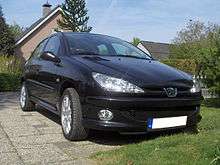
During the early 1990s, Peugeot decided not to directly replace the Peugeot 205, citing the reason that superminis were no longer profitable or worthwhile. Instead, Peugeot followed a unique strategy and decided that its new, smaller, supermini, the Peugeot 106 (launched in 1991) would take sales from the lower end of the 205 range while the lowest models of the Peugeot 306 range, launched in 1993 to replace the Peugeot 309, would take sales from the top-end 205s. Between the 106 and 306, Peugeot hoped that the 205 would not need to be replaced, and could be phased out slowly, while customers who would normally plump for the 205 would continue to have a choice with either a smaller or larger car. Unfortunately for Peugeot, this strategy did not work. With the 205 phased out, other superminis like the Ford Fiesta and Volkswagen Polo continued to sell well and even increased in popularity, and without a direct competitor to these cars Peugeot was losing sales fast. A new supermini was required, and the 206 was launched in 1998 as a somewhat belated replacement for the 205.
With no larger in-house rival from Citroën to base its new supermini on (the Citroën Saxo shared its platform with the 106), Peugeot developed an all-new front drive platform for the 206. It was built in France, and in the United Kingdom until the end of 2006. The end of British production coincided with the closure of the Ryton plant which Peugeot had taken over when buying Chrysler's European division in 1979.
From April 2010, the Peugeot 206 was no longer listed on Peugeot's current UK model range. LHD production finished in June 2010. Its eventual successor, the Peugeot 207, was launched in 2006. As of 2010, the twelve-year-old 206 was Peugeot's best-selling car of all time.[16]
Powertrain
The 206 was originally launched as a hatchback with 1.1L, 1.4L, and 1.6L petrol engines and a 1.9L diesel engine, a HDi version with common rail coming later. In 1999 a 2.0L GTi capable of 210 km/h (130 mph), and in 2003 a tuned version of the GTi called the Peugeot 206 RC (GTi 180 in the UK), were added to the range. It did 0–100 km/h (0-62 mph) in 7.4 seconds and it reached a top speed of 220 km/h (137 mph) with 177 PS (130 kW). In 2001, two more versions of the 206 were launched - the 206 CC (coupé convertible) with a folding steel roof and the 206 SW station wagon. A 4-door notchback sedan version, developed by Iran Khodro, was unveiled in late 2005, and it is available in the Iranian, North African, Chinese, Russian, Romanian, Turkish and Bulgarian markets.
Production and marketing
_XR_3-door_hatchback_(2011-01-05).jpg)
The Peugeot 206 was mainly manufactured in Peugeot's Poissy and Mulhouse factories in France, as well as in Ryton, United Kingdom, whereas outside Europe it was produced in Iran (Iran Khodro), Chile (for the Mexican and Colombian markets, French made 206s were cheaper than Chilean-built ones, in Chile), Argentina (PSA), Brazil (PSA), Uruguay (Oferol), China (Dongfeng), Indonesia (Gaya Motor) and Malaysia (Naza). In 2003, it received a minor facelift, getting clear headlights, different rear clusters, new side repeater lamps, chrome badges, a new range of colors, as well as other subtle interior revisions.[17]

The Peugeot 206 was also built at Ryton in Coventry, England, however, with the introduction of the 207 to the range, Peugeot decided to close the Ryton factory and move production to Slovakia with EU funding, due to the fact that they could produce their vehicles with same or better quality for a lower price there.
The Peugeot 206 proved to be a sales success all over Europe. It was the best-selling car in Europe from 2001 to 2003 and it was the best car of the year in UK for three consecutive years, between 1998 and 2001. The 1.4-litre XR was the best-selling model. On 26 May 2005, the 206 celebrated the five millionth unit produced since its commercial launch on 10 September 1998. Sales in the United Kingdom were strong from the start, with the 206 regularly being among the nation's five most popular new cars during its first six years on sale. Second hand examples of the 206 traditionally hold their value well, due to high demand.
Production in Brazil took place in Porto Real, Rio de Janeiro, starting in 2001 with the hatchback, followed by the station wagon version in 2005. The models produced there featured 1.0-litre 16-valve, 1.4-litre 8-valve and 1.6-litre 16-valve engines, the last two of which are flexible fuel engines (petrol/ethanol). The 1.0-litre version used a Renault-sourced engine and was produced until 2006.
The Peugeot 206 has also been produced in Villa Bosch, Buenos Aires, Argentina, since 1999. The trim levels manufactured are XR, XRD, XS, XT and XTD. The diesel powered versions use the naturally aspirated DW engine. Some of these versions are equipped with local-made engines in Jeppener, Buenos Aires.
In May 2006, the Malaysian car manufacturer Naza launched a locally assembled version of the model with the name of 206 Bestari. In 2006, Peugeot started production of the 206 in China. In September 2006, Dongfeng Peugeot-Citroën Automobile launched a slightly modified Peugeot 206 called Citroën C2 (this car was not related to the European-market Citroën C2).
Variants
206 CC (Coupé Cabriolet)
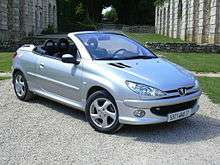
_CC_1.6_convertible_(2015-08-07)_02.jpg)
The Peugeot 206 CC (sometimes spelled as 206CC) was formally launched at the Paris Motor Show in September 2000 and was based on the Peugeot Two-oh-heart concept car, revealed two years before at the Geneva Motor Show.[9] It is a coupé cabriolet featuring a powered fold-away roof based on the Georges Paulin system, first seen on the 1935 Peugeot 402 Eclipse coupe.
It was produced in Cerizay, France, by the French company Heuliez,[18] which is specialized in producing short series for niche markets, such as convertibles or station-wagons. Production was stopped in early 2008,[18] and it has since been replaced by the 207 CC.
GTi180 and RC
_GTi_180_3-door_hatchback_(2011-11-18).jpg)
Introduced to the market in 2003, the Peugeot 206 GTi180 and 206 RC brought high performance to the product range. The range topping GTi180 was brought to the UK market, while the 206 RC was introduced to the rest of Europe. The new 'hot hatch' used the 2 litre EW10J4S engine, which produced 175 bhp (130 kW; 177 PS) thanks to variable valve timing and modified inlet and exhaust manifolds. Other features on the 206 GTi180 and 206 RC include 17 inch alloy wheels, racing bucket front seats, a short shift gear linkage and altered gearbox ratios (1st & 2nd gears). The new car was capable of reaching 62 mph (100 km/h) in 7.4 seconds.
The 206 GTi180 and 206 RC were produced to celebrate Peugeot's rallying successes from 2000 to 2003, and to replicate the success Peugeot had with the 205 GTi in the 1980s.
206 SD (Sedan)
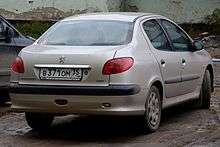
A notchback sedan model was developed in Iran under the name Peugeot 206 SD, as of 2006.[19] It was jointly designed by peugeot design center for iran khodro and is the fifth and last version of Peugeot 206 models.[20]
In 2006, Iran Khodro started exporting 206 SD to other countries including Russia, Turkey and Algeria.[21] In Brazil, the 206 SD will be produced starting at October 2008 and sold as 207 Passion. It is not related, however, to the 207 sold in Europe.
In Malaysia and China, it is also sold as the 207, which is sold only as sedan version there.[22]
206 Escapade
Following brands like Fiat and Volkswagen, Peugeot sells an off-roader version of the Peugeot 206 in selected South American markets, called the Peugeot 206 Escapade.[23] It is essentially a Peugeot 206 SW station wagon with a rugged SUV-like bodykit and higher and tougher suspension. It is powered with a 1.6L 16v engine.
Citroën C2
Starting 2006, the 206 is being sold by PSA, for the Chinese market only, under the Citroën brand, with a modified front and rear body; this is similar to the way the Citroën LN was derived from the Peugeot 104. The car has been sold as the Citroën C2 in China, although it has no common features with the European Citroën C2.[24]
Naza 206 Bestari
In Malaysia, the Peugeot 206 is also marketed under the Naza name. It is sold as the Naza 206 Bestari, and is available in 1.4L petrol engine (TU3JP), and with the option of 5- speed manual transmission and 4-speed automatic transmission (codename AL4). It was replaced by 206 SD, which is renamed as 207 in Malaysia.[22]
Engines
Petrol engines
- 1.0 L (999 cc) D4D I4 16v, 70 PS (51 kW; 69 hp)
- 1.1 L (1124 cc) TU1JP I4, 60 PS (44 kW; 59 hp)
- 1.4 L (1360 cc) TU3JP 8v I4, 75 PS (55 kW; 74 hp)
- 1.4 L (1360 cc) ET3J4 16v I4, 88 PS (65 kW; 87 hp)
- 1.6 L (1587 cc) TU5JP 8v I4, 88 PS (65 kW; 87 hp)
- 1.6 L (1587 cc) TU5JP4 16v I4, 109 PS (80 kW; 108 hp)
- 2.0 L (1997 cc) EW10J4 16v I4, 140 PS (103 kW; 138 hp)
- 2.0 L (1997 cc) EW10J4S 16v I4, 177 PS (130 kW; 175 hp)
Diesel engines
- 1.4 L (1398 cc) DV4 HDi Diesel I4, 68 PS (50 kW; 67 hp)
- 1.9 L (1868 cc) DW8 Diesel I4, 71 PS (52 kW; 70 hp)
- 1.6 L (1560 cc) DV6 HDi HDi 16v I4, 109 PS (80 kW; 108 hp)
- 2.0 L (1997 cc) DW10 HDi I4, 90 PS (66 kW; 89 hp)
Safety
In the EuroNCAP crash tests, the 206 (with dual frontal airbags and no side airbags) received a frontal rating of 11 / 16 and a side rating of 14 / 16 for a total of 4 / 5 stars.[25]
206+ (2009–2012)
The 206+ is a facelifted version of the 206, with a new front end and styling, similar to the European 207. It was manufactured in Mulhouse, France,[26] and was launched in February 2009.[27]
In May 2008, Peugeot's Brazilian branch announced it would not manufacture nor import the Peugeot 207 to Brazil, but instead it would change some elements of the 206 already in production,[28] arguing it would be impractical to do otherwise. The car, launched in August 2008, had minor changes were made to mechanical parts such as the suspension and gearbox.[29] It is marketed between the original 206 and the European 207, having the Volkswagen Fox, Renault Clio Campus and the Chevrolet Agile as its main competitors. It is offered in 3- and 5-door hatchback, estate and 4-door saloon bodystyles, including a facelifted 207 Escapade.
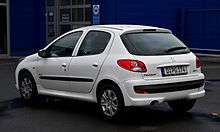
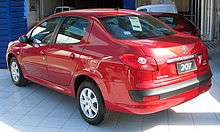
The car is sold under the "207 Compact" nameplate in Argentina (country in which it is also produced) and Uruguay, in order to differentiate it from the European 207 CC and RC, which are also sold in those countries. Peugeot planned to name it "207 Brasil" in Brazil, but soon dropped the "Brasil" from the name, as this decision gained generally negative reactions from the media.[30] The Brazilian 207 has also been criticized because it was perceived essentially as a facelifted 206, despite Peugeot's efforts to market it as an entirely new car and even selling it at a higher base price.[31]
In February 2009, Peugeot announced that this revised model will be made in France, at the Mulhouse plant, for the European (left-hand drive only) market, badged as the 206+.[32] as a patriotic recession-beating rejoinder to Renault's initiative of importing low priced Dacias from Romania. In May 2009 the company announced the recruitment of an additional 450 workers to support production at Mulhouse of the 206+ and the two door 308 models also assembled at this facility. This plant export the car under the 207 Compact nameplate to Chile (since 2010), Mexico (2009–2011) and Dominican Republic.
Iran Khodro Company (IKCO), which produces the Peugeot 206 in Iran since 2002, has announced the production of the "207i" in hatchback version.[33] In the initial phase, 5,000 Peugeot 207i (206+) cars would be produced by the end of the current Iranian year (March 2010), and will increase to 15,000-20,000 annually. At the end of year 2011, 207i producing in IKCO stopped during relation cut between IKCO and Peugeot because of international sanctions against Iran.
As of late 2012, Peugeot no longer offering 206+ in Europe due to higher demands of newer 208 and introduction of 207-based 301.
Motorsport
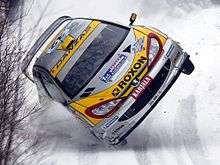
In 1999, Peugeot Sport unveiled the 206 WRC, and it competed for the first time in that year's World Rally Championship, with French tarmac veteran and long-time marque stalwart Gilles Panizzi narrowly failing, against a resurgent reigning champion in Mitsubishi's Tommi Mäkinen, to win the Rallye Sanremo. The car was soon a success, however, and won both the manufacturers' and drivers' championships in 2000, Peugeot's first such accolades since their withdrawal from the WRC after Group B was banned after the 1986 season, and achieved in the hands of Panizzi, Francois Delecour and Mäkinen's successor as drivers' world champion, Marcus Grönholm.
For 2001, Grönholm competed alongside two refugees of SEAT's exit from the championship at the end of 2000; compatriot Harri Rovanperä and the French 1994 world champion, Didier Auriol. Rovanperä and Auriol each contributed single wins, on Swedish Rally and Rally Catalunya respectively (the former to be a sole career win for the Finn, and the latter victory helped by assorted problems for the blisteringly quick debuting Citroën Xsara WRCs), before Auriol left the team at the end of the season. Grönholm, meanwhile, suffered sufficient reliability woes in the first half of the year such that he could manage no higher than fourth overall in the series, although Peugeot did fend off Ford, with a 1-2 result by the two Finns on the season-ending Rally of Great Britain to successfully defend the constructors' championship title.
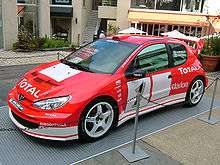
In 2002, Grönholm – despite now being paired in the factory line-up with defending 2001 champion from Subaru, the Briton Richard Burns – led Peugeot to a repeat of the WRC title double aboard his 206 WRC. His dominance that year was compared to Michael Schumacher's dominance of Formula One. In summary, Peugeot won two drivers' championships, in 2000 and 2002, and three manufacturers' titles in a row between 2000 and 2002. However, by 2003 the 206 WRC was beginning to show its age and was less effective against the competition, notably the newer Xsara WRC and the Subaru Impreza WRC, so it was retired from competition at the end of the season, to be replaced with the 307 WRC, albeit, unlike its predecessor, based not on the production version's hatchback, but its coupé cabriolet body style.
The Peugeot 206 WRC was awarded the Autosport "Rally Car of the Year" in 2002, preceded by the Ford Focus RS WRC and followed by the Citroën Xsara WRC. Peugeot GB created a Peugeot 206 rally championship aimed at young drivers. The championship was created to help young drivers develop their careers. The cars were built by Vic Lee Racing and drivers such as Tom Boardman, Luke Pinder and Garry Jennings all drove in the championship.
The WRC car was homologomated with the 206 GT, similar to the 206 GTi but with front and rear body extensions to bring the car from the standard road car's 3.83 meters to the rally car's 4 meter length.[34]
Advertising
A popular television commercial for the Peugeot 206 created by Giovanni Porro, known as "The Sculptor", involved a young man in India who sees the 206 advertised in a magazine and then goes about damaging a Hindustan Ambassador (including having an elephant sit on it) and then spending the night welding it. The following day, the car emerges as an exact replica of the 206's shape - except with many dents and discolorations. The man then takes his 206 replica driving with friends, with many interested onlookers. The track playing is "Heaven Is A Place On Earth" by Raja Mushtaq, later remixed as "Husan", by Bhangra Knights.
Sales and production
| Year | Worldwide production | Worldwide sales | Notes |
|---|---|---|---|
| 2004 | 795,094 | 795,000[35] | |
| 2005 | 669,883 | 676,500[35] | |
| 2006 | 465,480 | 475,100[35] | Model replaced by the 207 in Europe but 206 still on sale. |
| 2007 | 307,277 | 308,200[35] | Sales fall sharply. Buyers possibly shifting to the newer 207 instead. |
| 2008 | 303,440 | 292,300[35] | |
| 2009 | 364,674[36] | 370,800[35] | 206+ introduced. Sales reverse trend and increase for the first time since 2006. |
| 2010 | 477,815[36] | 472,800[36] | Worldwide sales almost recover to 2006 levels. |
| 2011 | 449,453[27] | 445,038[27] | Total 206 production reaches 7,775,482 units.[27] |
| 2012 | 187,300[37] | 199,900[37] | Total 206 production reaches 7,962,700 units.[37] |
See also
References
- ↑ "La saga du style chez Peugeot". E-mag Peugeot. Archived from the original on 25 October 2007. Retrieved 30 January 2014.
- ↑ http://www.trendo.ro/cataloage/cataloage/206_Sedan.pdf
- ↑ http://www.peugeot.com.ar/media/deliacms/media/90/9030-40f4b9.pdf
- ↑ "Statistics". adefa.com.ar.
- ↑ "Anuário Estatístico da Indústria Automobilística Brasileira". anfavea.com.br.
- ↑ According to the official websites for Argentina, Brazil, China, Colombia, Ecuador, Paraguay and Uruguay.
- ↑ "C3-XR". dongfeng-citroen.com.cn.
- ↑ "Peugeot 206 - A Legend Grows - Sixth Model in 200 Series Officialy Unveiled". autoweb.com.au.
- 1 2 http://www.goauto.com.au/mellor/mellor.nsf/story2/95F836403E56AD0FCA256AD8001AA768
- ↑ "Peugeot's Look Into the Future - 206 SW and 307 SW Concept Cars (Frankfurt Motor Show)". autoweb.com.au.
- ↑ "SALON FRANCFORT 2005 - IAA FRANKFURT - AUTOPRESSSALON FRANCFORT 2005 - IAA FRANKFURT - AUTOPRESS". autopress.be.
- 1 2 3 Ezequiel Herraiz. "Peugeot 207 Compact: todo a ganador". autocosmos.com.ar.
- 1 2 "竞争力几何 评国产版东风标致207三厢_汽车_腾讯网". qq.com.
- 1 2 "Peugeot to launch a low-cost 206". Automotive News.
- ↑ "CITRO脣N LANCE UNE NOUVELLE BERLINE COMPACTE EN CHINE". automania.be.
- ↑ "Peugeot Model Archive - The Peugeot 206 - Gti, Sport & so much more". peugeot.co.uk.
- ↑ "Peugeot 206". Auto Express.
- 1 2 Anderson S. "Peugeot 206 CC - Historical: Design, Manufacturing and Key dates and figures". 206-cc.fr.
- ↑ "Peugeot 206 SD to be exported to 30 countries". Payvand. 2006-09-26.
- ↑ "Peugeot 206 SD In Iran". Iran Khodro. Retrieved 2008-02-16.
- ↑ "Iran Khodro to export Peugeot 206SDs to 39 countries". Payvand. 2006-07-23. Retrieved 2008-10-28.
- 1 2 Yaohan, Seow (2010-11-04). "2011 Peugeot 207 Sedan Officially Launched In Malaysia". Motorstop Asia. Retrieved 2010-12-04.
- ↑ "Peugeot 206 Escapade". Paul Tan. Retrieved 2007-07-03.
- ↑ "Citroën lance une nouvelle berline compacte en Chine" (in French). Automanie. 2006-11-03.
- ↑ "EuroNCAP crash test ratings for the Peugeot 206". Euro NCAP. Retrieved 2007-10-29.
- ↑ "Production sites and main indicators" (PDF). 2010 Sustainable Development and Annual Report. PSA Peugeot Citroën. 2011-05-17. p. 48. Archived from the original (PDF) on 2012-03-16.
- 1 2 3 4 "PSA Annual Report 2012" (PDF). Car manufacturers. PSA. Retrieved 15 April 2013.
- ↑ "Peugeot mostra 206 com frente e painel renovados, chamado de 207 Brasil". Best Cars Web Site. Retrieved 2008-07-09.
- ↑ "O 207 dos emergentes". Best Cars Web Site. Retrieved 2008-08-11.
- ↑ "Muito barulho por nada". Best Cars Web Site. Retrieved 2008-07-09.
- ↑ "Peugeot 207 Brasil: primeiras fotos". Notícias Automotivas. Retrieved 2008-07-09.
- ↑ 2009_peugeot_206_plus (2009-02-23). "2009 Peugeot 206+ Released". The Motor Report. Retrieved 2009-11-13.
- ↑ "Iran Khodro, Peugeot sign export deal". Presstv.com. 2009-10-01. Retrieved 2010-04-10.
- ↑ Ruth Councell for CWN. "Peugeot Press Release - Peugeot Launches The 206 GT - 05 May 1999". Cwn.org.uk. Retrieved 2012-03-17.
- 1 2 3 4 5 6 "PSA". PSA-Peugeot-Citroen.com. 2010-06-30. Retrieved 2010-10-15.
- 1 2 3 "Engine specs from PSA Peugeot Citroën" (PDF). Creator and designer. PSA Peugeot Citroën. Retrieved 22 November 2012.
- 1 2 3 "Memento Mars 2013" (in French). PSA Peugeot Citroën. 21 February 2013: 50. Retrieved 31 July 2013.
External links
| Wikimedia Commons has media related to Peugeot 206. |
| « previous — Peugeot, a marque of Groupe PSA since 1976, car and LCV timeline, 1980s–present | |||||||||||||||||||||||||||||||||||||
|---|---|---|---|---|---|---|---|---|---|---|---|---|---|---|---|---|---|---|---|---|---|---|---|---|---|---|---|---|---|---|---|---|---|---|---|---|---|
| Type | 1980s | 1990s | 2000s | 2010s | |||||||||||||||||||||||||||||||||
| 0 | 1 | 2 | 3 | 4 | 5 | 6 | 7 | 8 | 9 | 0 | 1 | 2 | 3 | 4 | 5 | 6 | 7 | 8 | 9 | 0 | 1 | 2 | 3 | 4 | 5 | 6 | 7 | 8 | 9 | 0 | 1 | 2 | 3 | 4 | 5 | 6 | |
| City car | iOn | ||||||||||||||||||||||||||||||||||||
| 107 | 108 | ||||||||||||||||||||||||||||||||||||
| Supermini | 104 | 106 | 207 | 208 | |||||||||||||||||||||||||||||||||
| 205 | 206 | 206+ | |||||||||||||||||||||||||||||||||||
| Small family car | 305 | 301 | |||||||||||||||||||||||||||||||||||
| 309 | 306 | 308 | 308 | ||||||||||||||||||||||||||||||||||
| 307 | 408 | ||||||||||||||||||||||||||||||||||||
| Large family car | 504 | 405 | 406 | 407 | 508 | ||||||||||||||||||||||||||||||||
| 505 | |||||||||||||||||||||||||||||||||||||
| Executive car | 604 | 605 | 607 | ||||||||||||||||||||||||||||||||||
| Coupé | 406 Coupé | 407 Coupé | |||||||||||||||||||||||||||||||||||
| RCZ | |||||||||||||||||||||||||||||||||||||
| Convertible | 205 Cabriolet | 206 CC | 207 CC | ||||||||||||||||||||||||||||||||||
| 306 Cabriolet | 307 CC | 308 CC | |||||||||||||||||||||||||||||||||||
| Mini MPV | 1007 | ||||||||||||||||||||||||||||||||||||
| Compact MPV | 5008 | ||||||||||||||||||||||||||||||||||||
| Large MPV | 806 | 807 | |||||||||||||||||||||||||||||||||||
| Crossover | 2008 | ||||||||||||||||||||||||||||||||||||
| 3008 | |||||||||||||||||||||||||||||||||||||
| SUV | 4007 | 4008 | |||||||||||||||||||||||||||||||||||
| LAV | Bipper | ||||||||||||||||||||||||||||||||||||
| Partner | Partner | ||||||||||||||||||||||||||||||||||||
| LCV | J5 | Expert | Expert | Traveller | |||||||||||||||||||||||||||||||||
| J7 | J9 | Boxer | Boxer | ||||||||||||||||||||||||||||||||||